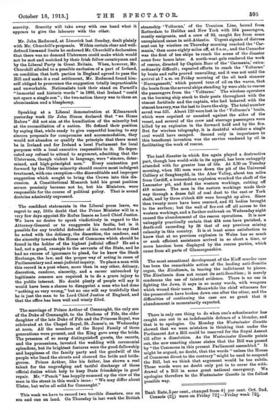This week we have to record two terrible disasters, one
on sea and one on land. On Thursday in last week the British steamship 'Volturno,' of the Uranium Line, bound front Rotterdam to Halifax and New York with 564 passengers, mostly emigrants, and a crew of 93, caught fire from some unexplained cause in mid-Atlantic. Urgent signals of distress sent out by wireless on Thursday morning reached the Car- mania,' then some eighty miles off, at 8 a.m., and the Cunarder was the first of ten ships to reach the scene of the disaster some four hours later. A north-west gale rendered the work of rescue, directed by Captain Barr of the Carmania,' extra- ordinarily difficult ; repeated efforts to reach the Volturno' by boats and rafts proved unavailing, and it was not until the arrival at 7 a.m. on Friday morning of the oil tank steamer Narragansett,' which poured tons of oil on the waves, that the boats from the several ships standing by were able to rescue the passengers from the ' Volturno.' The wireless operators on the burning ship stuck to their posts throughout with the utmost fortitude and the captain, who had behaved with the utmost bravery,was the last to leave the ship. The total number saved was 521. About 120 were lost in the Volturno's ' boats, which were capsized or smashed against the sides of the vessel, and several of the crew and steerage passengers were killed by an explosion in the forward hold and by the fire. But for wireless telegraphy, it is doubtful whether a single soul would have escaped. Second only in importance to this beneficent invention was the service rendered by oil in facilitating the work of rescue.














































 Previous page
Previous page